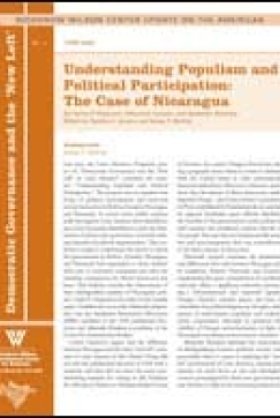Understanding Populism and Political Participation: The Case of Nicaragua



In recent years, public opinion polls throughout Latin America have identified a great deal of popular dissatisfaction with the institutions of democratic governance and with existing channels of political representation. Last year, the Latin American Program convened the seminar "Understanding Populism and Political Participation" to examine new forms of political participation and state-civil society interaction in Bolivia, Ecuador, Nicaragua, and Venezuela. This conference sought to understand the extent to which of these countries' governments had responded with new or innovative programs, and what the resulting consequence for liberal democracy has been. This bulletin contains the observations of three distinguished analysts of Nicaraguan politics: Carlos F. Chamorro is the editor of the weekly paper Confidencial; economist Edmundo Jarquín, who was the Sandinista Renovation Movement (MRS) candidate in the 2006 presidential elections; and Alejandro Bendaña is president of the Center for International Studies.

The Wilson Center’s prestigious Latin America Program provides non-partisan expertise to a broad community of decision makers in the United States and Latin America on critical policy issues facing the Hemisphere. The Program provides insightful and actionable research for policymakers, private sector leaders, journalists, and public intellectuals in the United States and Latin America. To bridge the gap between scholarship and policy action, it fosters new inquiry, sponsors high-level public and private meetings among multiple stakeholders, and explores policy options to improve outcomes for citizens throughout the Americas. Drawing on the Wilson Center’s strength as the nation’s key non-partisan policy forum, the Program serves as a trusted source of analysis and a vital point of contact between the worlds of scholarship and action. Read more
